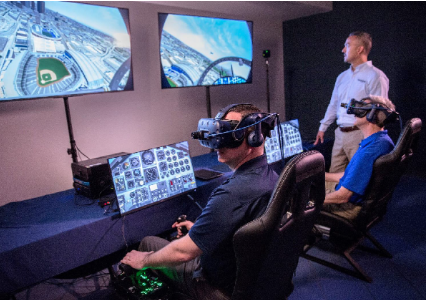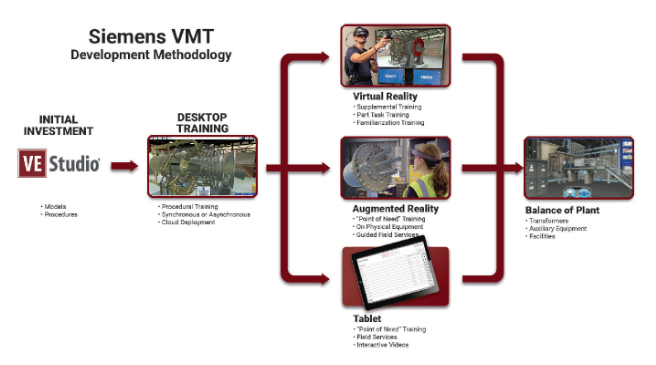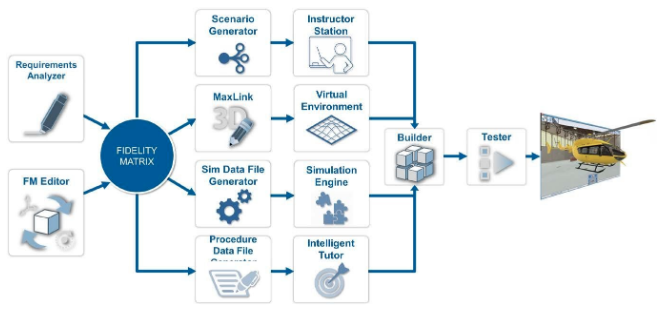This Healthcare Industry Sector Report includes a wide range of companies and startups and the kinds of customers they serve, showing how impactful their VR and AR solutions have become to healthcare customers.
Given the world’s current pandemic situation where there are travel restrictions and the increased need for remote and virtual healthcare (i.e, virtual clinics), training and the reskilling of millions in the workforce, it is now more important than ever for companies to have healthcare ready, easy to deploy digital solutions. Virtual Reality and Augmented Reality have proven to show value within many critical healthcare verticals including training, surgery, wellbeing, etc.
There are plenty of other examples and predictions that demonstrate the importance of VR and AR to forward-thinking healthcare in the immediate future. Successful trials (and increasing number of deployments) of VR and AR in healthcare are getting the competitors of early adopters companies to start recognizing that they may be missing out on the real strategic advantage they can achieve.
Foreword by 4dmed.ltd
I picked up the phone and heard my long-time client Sam say, “How do I slow down the clients coming in? I can’t keep up!” As we know that this virus has forced us to stay at homes and medical students, doctors and trainees are not able to go to their respective places. It is not just about the medical field, this pandemic has affected all without any discrimination. During these hard times, we are providing efficient ways to train the healthcare professionals. 4DMEDLtd is medical software and medical device Development Company that designs interfaces for the health care education research.
With the help of this platform, you will pass through these tough times.We have used the VR technology to help the VR industry achieve its target of training people. 4DMED has created a library so that people can achieve best health program for their environment. Cloud has started two programs; one is to train the surgeons virtually via senior trainers and the other is to train junior trainees, nurses and medical students. 4DMED products includes a simulator which offers double screen feature to keep the trainees engaged and help them learn quickly.Complete surgeries can be practiced at increasing levels of difficulty, so that the trainees get all the experience. 4DMED has also designed a software suite of virtual reality for the medical training sector. It will help reduce the human error and will assist the VR industry.
This virtual reality platform created will help the seniors with improved mental health as well as physical health due to continuous movement of body while usingVR. Discussions among the seniors will provide residents with much useful information; which is necessary for a happy community.4DMED advanced software and hardware technology will help medical professionals to experience real life surgical simulation. VR headset and touch sensor helps the user to interact with virtual operation rooms. This real life experience fills the communication gap and also increases the decision making of the medical staff.
4DMEDoffers a wide range of simulator technologies depending up on the objectives of respective medical professional. This virtual technology creates a realistic training environment for the medical professionals. We are playing our part for the VR industry by using the virtual reality technology to teach different universities and colleges from around the globe. It includes universities of Canada, USA, Europe, Asia, and Middle East. The purpose of using this technology to assist people in training and making their lives normal during this rough time.AugmentedReality and Virtual Reality have proven to show value within many critical healthcare verticals including training, surgery, wellbeing, etc.
Director of 4DMed ltd
Foreword by Dark Slope
THE FUTURE OF LEARNING IS IMMERSIVE. This belief is at the core of Dark Slope’s Involve XR platform; a technology that has been built to empower instructors and training organizations to migrate their scenario training programs in to the virtual world.
It is impossible to ignore the ways our world has transformed seemingly overnight. Entire industries have had to contend with what we’re now referring to as our new reality. We’ve heard the phrases “pivot,” “adapt” and “innovate”more in the last four months than cumulatively over the past two years. Alongside this up heaval we have seen how the pandemic has single handedly accelerated the adoption of ‘emerging’ technologies like VR and AR. Most importantly we have caught a glimpse of how these technologies can play a critical and transformational role in up skilling today’s workforce and in training the next generation of health care workers.
Immersive learning will revolutionize how we train for high-risk jobs in the healthcare and safety fields, and how we most effectively arm doctors, nurses and first responders with critical skills best learned through practice. Dark Slope’s InvolveXR empowers training organizations to extend their offerings into VR and AR, allowing them to train remotely in live virtual classes with live ICU,ER, de-escalation, and other critical skill scenarios.
We recently announced our partnership withTheAmerican College of Chest Physicians(CHEST). Basedon CHEST’s curriculums we’re set to develop a complete virtual reality training program on intubation techniques and best practices that will be made available through our learning platform InvolveXR. Of course, airway procedures and intubation are topics at the forefront of critical care training right now, and we hope our technology can play a role in equipping critical care workers with skills and protocols they need to better combatCOVID-19.The training itself consists of live virtual scenario training, in fully immersive and interactive ICU environments with a trainer and other live learners present. Physicians and other critical care workers will engage with dynamic, team-based, true-to-life training scenarios on intubation procedures.
In this precarious time virtual simulation is emerging as a key pillar of support for healthcare workers, offering realistic experiences in safe, remote environments, effectively expediting the deployment of new skills and protocols, while reducing costs for simulation training. With all the healthcare industry challenges this year has brought, the responses to XR training has been reassuring. COVID-19 has underlined our belief in the massive potential of virtual learning and the ability to use these technologies to create amore skilled healthcare workforce, delivering better patient outcomes.
CEO, DarkSlope















